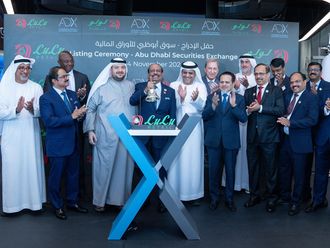Dubai: Abu Dhabi Commercial Bank (ADCB), the UAE's third-largest lender by assets, became the second Abu Dhabi-based bank to tap the Southeast Asian pool of liquidity this year when it kicked off its 3.5 billion Malaysian ringgit (Dh4.04 billion) medium-term note (MTN) programme yesterday.
The first phase will see the issuance of 500 million ringgit in five-year bonds going up to 3.5 billion ringgit, the bank said. The National Bank of Abu Dhabi, the country's second-largest lender, last month opened its own debt offering in Malaysia with 500 million ringgit in Islamic bonds at a coupon rate of 4.75 per cent.
ADCB's bond is intended to diversify capital resources for general operational purposes, a spokesperson told Gulf News. The bond sale will be arranged by Standard Chartered Bank and RHB Investment Bank.
RAM Ratings confirmed ADCB's long-term ‘AAA' and short-term ‘P1' financial institution ratings, citing the "strong connection to the governments of Abu Dhabi and the UAE".
The Abu Dhabi government holds a 65 per cent majority stake in the bank. It made two capital injections worth Dh10.6 billion in 2009, as the global credit crunch took its toll.
Ratings
ADCB's ringgit bond has been rated ‘AAA'. The long-term ratings carry a ‘stable' outlook.
"Abu Dhabi-based banks enjoy government support; this was made clear throughout the financial crunch," said Rami Sidani, Head of Middle East and North Africa Portfolio Management at Schroeders in Dubai.
"Now that global credit markets are opening up, it makes sense for Abu Dhabi banks to tap them for funds. NBAD got a good rate on its bond last month and I don't expect ADCB to have any problems in spite of its relatively fragile finances," Sidani said.
"We know there is excess liquidity in the East; government backing makes it easy for Gulf banks to tap into it," Sidani said.
ADCB's shares closed 1.19 per cent lower at Dh1.65 on a slightly positive Abu Dhabi Securities Exchange yesterday.
The bond's ratings reflect the "demonstrated support" of the UAE and Abu Dhabi governments in times of crisis, said Promod Dass, head of RAM's Financial Institution ratings. "In our assessment of the bank's asset-quality indicators, comfort is drawn from ADCB's strong capitalisation levels."
ADCB's overall risk-weighted capital-adequacy ratio stood at 15.9 per cent at the end of June 2010, adequate in relation to the bank's "growth strategies and potential impairment charges on troubled credits", the agency said.
Kevin Taylor, ADCB's group treasurer, said in a statement that the notes will be "a good source" of five-year funding "well within ADCB's cost of funds".
The notes will "contribute to reopening capital markets for ADCB and other UAE issuers", he said.












